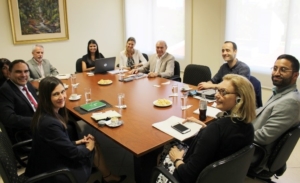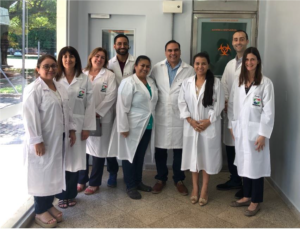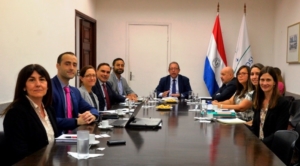
Improving Economies for Stronger Communities (IESC)
2000 M Street NW
Suite 250
Washington, DC 20036
Tel: 202-589-2600
Email: iesc@iesc.org
Get Updates
Get the latest news from IESC, delivered straight to your inbox.
Trade–Facilitating Agricultural Systems and Technology (T–FAST), will simplify, modernize, and harmonize processes for the export, import, and transit of agricultural goods in Paraguay through implementation of the World Trade Organization (WTO) Trade Facilitation Agreement (TFA). The project will result in a 14 percent reduction in the cost of trade in agricultural goods, a 30 percent decrease in release time of agricultural goods, and improvements in predictability through transparency and automatization of processes—thereby reducing nontariff barriers to trade. Just as importantly, T–FAST will strengthen and empower Paraguay’s National Trade Facilitation Committee (NTFC) to lead an agenda for continual improvements in trade facilitation that will have a lasting impact well beyond the project term. T–FAST will focus on implementation of Paraguay’s Category C Notifications—where they intersect with trade in agricultural products—to implement both the letter and spirit of the TFA. T–FAST will create improved government processes and systems to increase the efficiency of trade flows for agricultural exports, imports, and goods in transit; civil servants who have the capacity to implement changes through a continuous learning cycle; and improved mechanisms for public-private sector engagement around trade facilitation.
T–FAST’s goal is to expand regional and international trade in agricultural goods[1] by reducing costs, rapidly releasing goods, and increasing predictability. T-FAST objectives are:

T-FAST meeting at the Union Industrial Paraguaya headquarters
Capacity Building: Promote Improved Policy and Regulatory Framework
This activity will establish the structure through which subsequent activities will take place. It will include strengthening political will by tying TFA priorities to broader government priorities, building the capacity of the NTFC to effectively develop the framework for policy and regulatory reform, and establishing the project Steering Committee.
Capacity Building: Government Institutions
This activity will include technical and managerial capacity building for select government institutions involved in the regulation and facilitation of trade in agricultural products. The technical assistance will design and manage change at the institutional level for TFA implementation.
Capacity Building: Trade Associations
This activity will provide technical and managerial capacity building to enable associations to effectively advocate for trade-related reforms.
Infrastructure Market and Trade
This activity will support IT systems, lab equipment, and inspection-related infrastructure tied to the capacity building described in Activity 2 (Capacity Building of Government Institutions).

T-FAST meeting at SENACSA labs in February 2020

Meeting held on February 28 at the Ministry of Foreign Affairs
The International Executive Service Corps (IESC) will lead the four-year, $8.9 million project. T–FAST combines IESC’s experience in facilitating trade, enterprise development, and bringing business solutions to development challenges through successful implementation of USDA projects; the Center for International Private Enterprise’s (CIPE) in-depth global and regional expertise in best practices for trade facilitation interventions; and Kansas State University’s (KSU) excellence in phytosanitary safety. IESC will also draw on a variety of Paraguayan firms with relevant expertise, including in trade law and information and communication technology (ICT).
Funder: United States Department of Agriculture (USDA) Food for Progress
Contact in Paraguay: Daniel Oviedo, Project Director (doviedo@iesc.org)
Contact in the U.S.: Chad Ford, Associate Vice President (cford@iesc.org)
[1] Food for Progress Program (FFPr) USDA Strategic Objective 2 (SO2) funded assistance through the sale of awarded agricultural commodities
[2] USAID. A Comprehensive Approach to Trade Facilitation and Capacity Building: Connecting Developing Countries to Supply Chains. Second Edition. 2015.
[3] Ibid.
 Trade Safe (TraSa)
Trade Safe (TraSa)